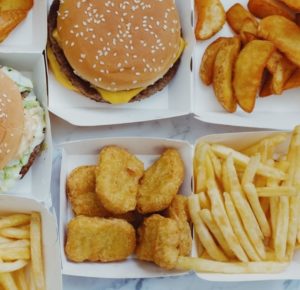 For many years there have been dire warnings about the negative effects of fast food on the body. However, it would seem that not many people are paying attention to the problems.
For many years there have been dire warnings about the negative effects of fast food on the body. However, it would seem that not many people are paying attention to the problems.
In fact, the Centers for Disease Control and Prevention have stated that around forty percent of North Americans are eating fast food on a daily basis.
Now it might be a coincidence that there are more people who are overweight, but fast food probably contributes to this issue.
While there might be some unpleasant reminders when stepping on the scale, eating fast food more often than not, has been associated with a number of very serious diseases.
Perhaps driving past the fast-food restaurant would be better for everyone’s health.
Here is a List of Some of the Negative Effects of Fast Food:
Heart Health:
One of the main problems with fast food is the amount of highly saturated fat that ends up in the food since most of it is fried.
Eating a lot of saturated fat has been linked with a raised risk of heart disease.
In fact, the American Heart Association has recommended limiting the intake of saturated fat.
They actually recommend eating no more than thirteen grams of saturated fat a day.
Did you know that a McDonald’s Big Mac with large fries contains fourteen grams of saturated fat?
Another problem with this meal is the risk of diabetes due to the number of refined grains.
As well, the meal contains a lot of salt which can increase blood pressure.
Metabolic Syndrome:
 First of all, what is metabolic syndrome? It is a bunch of ailments that happen concurrently.
First of all, what is metabolic syndrome? It is a bunch of ailments that happen concurrently.
This can include an increase in the risk of type 2 diabetes, heart disease, including possible stroke. Another problem is an increased risk of getting dementia.
Along with these problems, there can also be an increase in blood pressure, having high blood sugar, an excess amount of body fat especially around the middle of the body (waist), and including abnormal triglyceride or cholesterol levels.
One of the problems with fast food is that most orders come with a soda of some kind. This beverage can really mess with a person’s health.
There have been a number of studies that found that when you drink sugar-sweetened beverages regularly, there is an increase in developing metabolic syndrome.
Type Two Diabetes:
 When we consume a lot of processed foods, we run the risk of developing Type 2 Diabetes.
When we consume a lot of processed foods, we run the risk of developing Type 2 Diabetes.
Being obese and eating too many foods with added sugar is one of the main reasons for diabetes.
What is diabetes? This disease is caused by the body being unable to correctly process blood sugar.
As a result, the body becomes unable to allow the hormone insulin to do its job correctly.
According to a recent study, the risk of developing diabetes doubles when eating fast food more than two times a week.
High Blood Pressure:
We all know that fast food contains a lot of calories as well as fat and salt. These three are all bad when it comes to blood pressure.
When we eat too much fast food there is a risk of developing high blood pressure.
 The problem is that high blood pressure increases the risk of stroke or heart attack.
The problem is that high blood pressure increases the risk of stroke or heart attack.
It has been found that people who eat just one high fast meal, saw their blood pressure increase over those who ate a low-fat meal.
In fact, their blood pressure increase by 1.5 times over those who ate low-fat meals.
Although having a fast food meal occasionally won’t generally affect your health, there are other foods that we should consider eating in moderation.
For instance, dressings, condiments, and even cheese can add a lot of salt/sodium to a meal.
Have a sub sandwich with lean meats such as turkey or chicken as a better choice.
Fast Food and Cancer:
The problem with eating too much fast food is the amount of added sugars along with processed meat that has a negative effect on the body.
As a result, there may be an increase in the risk of getting some cancers.
There was a study published in 2018 that stated there was a ten percent increase in overly processed foods being associated with a higher risk of cancer.
The report also stated that foods with high sugar content along with fat were associated with this risk.
As well, in Time Magazine, there was an article that mentioned how sugary processed foods could be linked to breast cancer.
Fast Food Lacks Nutrition
 Sure the appeal of fast food is that you drive up to the order screen and less than ten minutes later you have a meal.
Sure the appeal of fast food is that you drive up to the order screen and less than ten minutes later you have a meal.
However, the problem around fast food production is that there are fewer healthy ingredients used in the meals.
We already discussed that there are loads of sodium (salt) and unhealthy fats and sugar used to prepare the food.
Sure the food may taste great, but there is a lack of nutrition which often means eating more to feel satisfied.
Most fast-food restaurants don’t offer fresh vegetables, fruits, or even lean proteins or whole-grain options.
As a result, there aren’t any important micronutrients in the food such as lean protein, healthy carbohydrates, good fat, and water.
For instance, iceberg lettuce contains less iron and calcium as well as fiber that can be found in other greens such as spinach.
Micronutrient Lean Protein:
 Protein is an important micronutrient that is responsible for helping to build bones, tissue, skin, the organs in the body, and as well our hair.
Protein is an important micronutrient that is responsible for helping to build bones, tissue, skin, the organs in the body, and as well our hair.
As well it also makes enzymes that help to digest food.
It is important to make sure certain hormones have the nutrients they need in order to function properly.
You could say that protein is essential for every working system in the body. Without protein, our brains wouldn’t work properly.
As a result, getting enough protein every day is important. You don’t have to eat animal protein, you can eat beans and legumes as well.
Even plants such as fruits, vegetables, and nuts contain amounts of protein.
Micronutrient Carbohydrates:
We are always hearing about the downside of eating carbohydrates.
Unfortunately, all carbohydrates whether they are simple (sugars) or complex (whole grains) are all labeled carbohydrates.
 While it is true that simple carbohydrates can cause health problems, complex carbohydrates are important for the body.
While it is true that simple carbohydrates can cause health problems, complex carbohydrates are important for the body.
Complex carbohydrates take more time to digest and as a result, give us longer-lasting energy.
The best source of complex carbohydrates include vegetables, fruits, beans, and legumes along with whole grains (quinoa, brown rice).
Because they contain more fiber that will absorb water, these carbs move through the digestive tract slower.
As a result, the body is able to absorb nutrients.
Micronutrient Good Fats:
 Every part of the body needs fats. They are an important building block and are part of what makes up our hormones.
Every part of the body needs fats. They are an important building block and are part of what makes up our hormones.
Fats are also extremely important for brain function.
In fact, the neurons in the brain and nervous system are actually made up of both protein and fat.
Unsaturated fats are important and include omega-3 fatty acids that can be found in flax seeds, walnuts, and salmon.
Micronutrient Water:
 Did you know that water was a micronutrient? Although it doesn’t provide energy, it is still important.
Did you know that water was a micronutrient? Although it doesn’t provide energy, it is still important.
Water is essential for our circulatory system since blood is mostly composed of water.
We need to stay hydrated so that water can do its job.
Another reason we need water is for our food to get digested and to get rid of waste from the body.
When we drink water before and after our meals and even during meals, it helps break down the food more easily and helps improve digestion.
As well, we need both fiber and water in order to prevent constipation.
If You Eat Fast Food, This Happens To Your Body Video:
Sure fast food is cheap and sometimes it even tastes good.
The problem is that it isn’t good for our health especially if we eat this food every day.
Unfortunately, a lot of research hasn’t been done on what our bodies need from our food in order to remain healthy until recently.
The more we know about what makes our bodies work best, the more healthy we will stay long into our senior years.
So the next time you are tempted to stop at a fast-food restaurant, ask yourself if the food is going to give you positive or negative health benefits.






